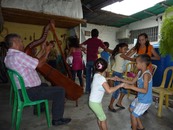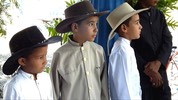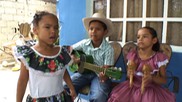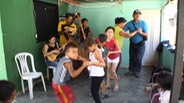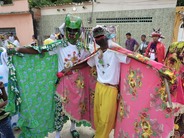Joropo is a style of music and dance from the central plains (Los Llanos) of Venezuela. The music is often known as “plains music” (música llanera). Joropo is derived from the Spanish fandango, a word that was still in use half a century ago to mean “party” or “dance.” Joropo is often sung, and the primary instruments are harp, cuatro (a small four-stringed guitar), and maracas, though the bandola (a different kind of four-stringed guitar) may replace or accompany the harp.
Traditionally, joropo was not taught; indeed, music was a low-status activity, and some musicians actively discouraged their children from learning, for example by banning them from playing the adults’ instruments. Children generally learnt by observing adults at parties and country fairs and experimenting in private. Older musicians also emphasize the importance of Los Llanos themselves in the transmission of music: they talk about the landscape and natural phenomena as inspiring musicians or even generating music itself. As in many parts of the world, including Cuba, music is “in the blood,” but it is also in the land.
Nevertheless, the land has long been changing, and urbanization and new technology have completely transformed the learning process. Today country fairs are few and far between, and they have been rendered redundant as a site of transmission by the spread of recordings as learning tools. Municipal Houses of Culture and music and dance schools have been springing up in recent decades, and most learning now takes place in such institutions. Still, self-teaching remains common, particularly in the case of the harp: a number of adult musicians described being shown the very basics by a relative, friend or teacher, and then learning alone from that point onwards. Harpists commonly take up the instrument in their mid- to late teens; most children start with cuatro, maracas and dance.
Opinions about these changes vary widely: some lament the loss of connection with nature and the institutionalization of learning, while others are excited about the ever-increasing virtuosity and breadth of musical knowledge of younger musicians, who are taking the music off in previously unimaginable directions, inventing new techniques and incorporating elements from jazz, bossa nova, and other genres.
Venezuela’s main claim to fame in the field of music education is El Sistema, its youth orchestra training program. Created in 1975, it has spawned Gustavo Dudamel and the Simón Bolívar Youth Orchestra. While El Sistema focuses primarily on classical music, some children inevitably take an interest in traditional music as well, meaning that there are an increasing number of musicians who are “bilingual” – competent in both styles, and able to play by ear and from written music. The impact of El Sistema is hard to assess – there are undoubtedly more children learning music than ever before, but are they being diverted away from Venezuelan music towards classical music, thereby weakening national traditions? One thing, however, is clear: in Venezuela, there are children learning music and dance wherever you turn.
Geoff Baker
Go to Participants in Venezuela
Go to Films of Growing into Music in Venezuela





